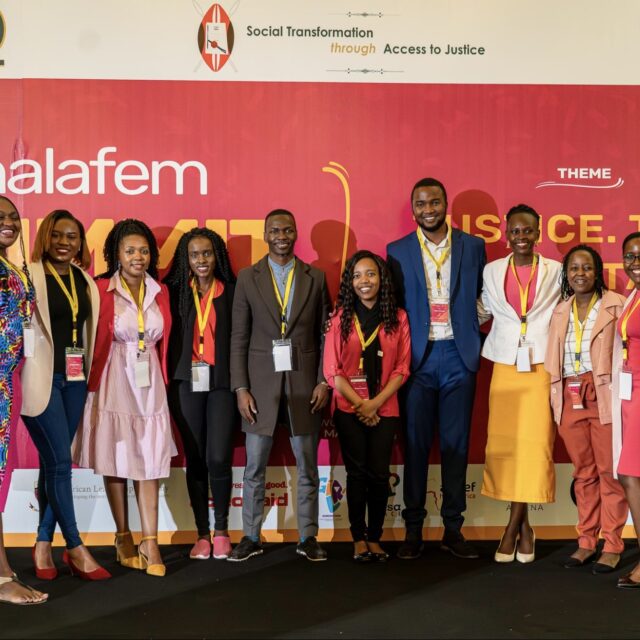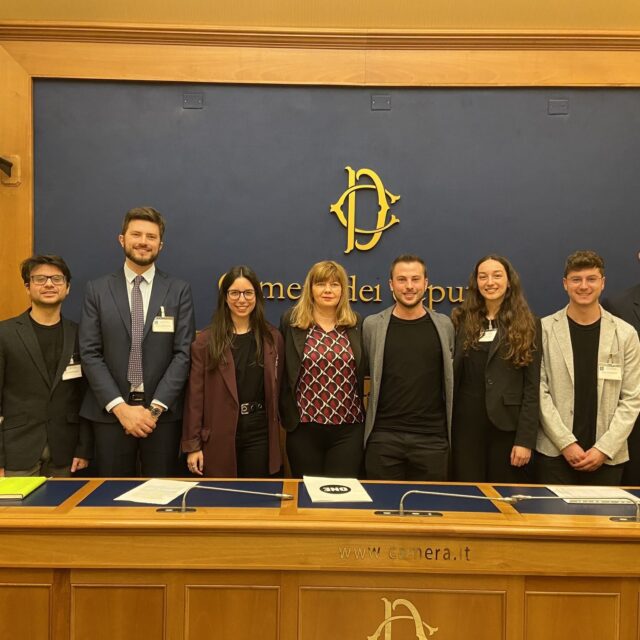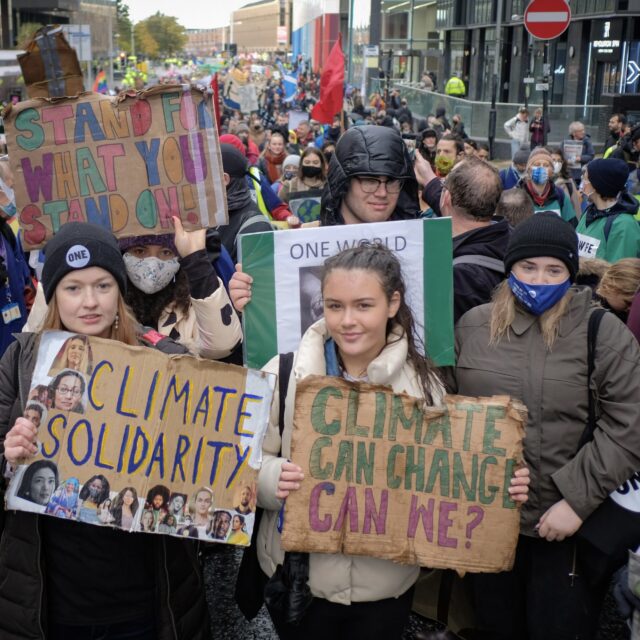Amelie Fischer is the winner of the 2022 Samantha Singh Memorial Award. Her award-winning essay answered this question:
‘Our response to the climate crisis is going to change economies and societies in every part of the world. How can young people and activists in Africa respond in a way that incentivises leaders to protect both people and the planet?’
19% for 92% vs 81% for 8%. What initially looks like a randomized stringing together of percentages illustrates the global output of emissions and the responsibilities that go with it. To put the numbers into context: The 19% of the world’s population who live in the so-called Global North are responsible for 92% of the CO2 emissions worldwide. The other 81% living in countries of the so-called Global South are responsible for the remaining 8% of emissions.
The concept of climate justice puts the question of responsibility in the foreground: Countries and people in the Global North are responsible for the biggest share of emissions and are the main polluters and profiteers. At the same time, it is the countries and people in the Global South who are the first ones to be affected by the consequences of the climate crisis with their own bodies in the form of extreme weather events. That’s why they are called MAPA (Most Affected People and Areas). The African continent is one of the most affected regions in the world and its people, especially its youth, belong among the most affected people by the climate crisis.
I am part of the 19%. I am among the polluters and profiteers, the privileged and the preoccupied. Before I go any further, I have to define my position in this world of global power imbalances: I am a white cis woman, born and raised in Germany. I grew up mistaking climate activism for a free time activity, ignorant of the African legacies I was trampling on. The legacies of Wangari Maathai, Fatima Jibrell, Nnimmo Bassey, Adwoa Addae, Vanessa Nakate, Ayakha Melithafa and Elizabeth Wanjiru Wathuti to name just a few African environmentalists and climate justice leaders. Late, but not too late, I learned that climate justice movements were no more an invention of the west than the fight against the climate crisis had begun with Greta Thunberg’s school strikes.
Knowing so many great African masterminds full of ideas and inspiration, what makes me even think I’m able to answer this essay’s question? Moreover, what makes me think I am entitled to give advice to young African people on how to deal with their leaders when young people are not taken seriously enough in my country either? It smacks bitterly of me as a white woman from a country in the Global North to dispense advice or even suggest policies that will always arise from a colonial continuity. So the only way I see myself entitled to writing this essay is by putting (young) African voices at the forefront to amplify and spread the wisdom, ideas and solutions they have proven to have. I don’t want to put myself in the position of telling African people how they could do things better. I would much rather think about how all parties involved, young, old, African, European and many more people, can work together as a world community to give Africa and its knowledge the visibility they deserve. And maybe raise the question: What can the world learn from Africa?
Because what people in the Global North and white-dominated climate justice movements tend to forget: there have been numerous global and centuries-old resistance movements against the destruction of the environment and climate in the Global South. They have been forgotten. Or rather, have been made forgotten…
That’s a shame because we’re talking about almost 17% of the world’s population. By the end of this century, one-third of the world‘s population will live on the African continent. What makes it all so significant is that Africa’s population is incredibly young: 60% of its 1.25 billion people are 25 or younger. Whether this represents a change or a risk for Africa’s future depends on how African leaders deal with the young population.
New data compiled from 4,500 face-to-face interviews with 18- to 24-year-olds across the continent by the Ichikowitz Family Foundation, an African charity, shines a light on the concerns of young people in 15 African countries: While 70% of Africa’s youth are concerned about climate change, less than half are satisfied with how their leaders are tackling it. Among those polled, 85% said their governments should be more proactive in addressing climate change, led by 99% of Rwandans, 95% of Ethiopians and 95% of Malawians. Besides wanting bolder policy action, about two-thirds said they actively support, take part in or donate to environmental causes, while 64% are trying to reduce their carbon footprint. As Quartz Africa reporter Abdi Latif Dahir states: “Africa‘s cities face the harshest outcomes of climate change and its young people know it.”
The Africa Youth Initiative on Climate Change, therefore, demands that “African youth should be part of the climate solutions being conceptualized in rooms behind closed doors”.
So before we ask how young people and activists in Africa can respond to the existing climate crisis in a way that incentivizes (western) leaders, we have to question why they even have to create incentives in order to be heard? This question is not only a question of policy but a question of culture, history, colonial continuities, ecological responsibility, knowledge and the distribution of it, science, discrimination and global power imbalances. It has to be treated from all of these perspectives.
Colonial continuities and global interdependencies fundamentally shaped our world the way it is today and determine who has a say in politics and decision-making and who doesn’t. The fight against the global climate crisis is often framed as a western fight. It is the fight of the countries who supposedly are at the climax of development, a normative concept they consider to be a linear process every other country has to go through sooner or later. Power imbalances exist in every area, politically, economically, and culturally. But they also exist in the world of science.
Decolonization and deconstruction are two keywords in that matter. The world needs to develop a view on the climate crisis that is radically decolonial and antiracist. This starts with the knowledge we own and promote as an international society: Protests, debates, discussions, politics, media, education, social movements, institutions – they all highly rely on research and findings of Western science, ignoring the indigenous and pre-colonial knowledge, ideas, perspectives, societal structures and systems colonialists tried to wipe out so badly.
Considering this as the status quo, what needs to be done? Black and indigenous knowledge and solutions have to be made visible and accessible again, and this can only happen when they become a part of educational systems in Africa and the rest of the world. Valuable knowledge needs to be traced back to its roots and as many postcolonial scientists and prominent figures argue: Young Africans need to learn to be proud of their countries and achievements, their cultural heritage and they need to learn to rely back on indigenous knowledge to come up with solutions.
Research by two Nigerian scientists, namely Alokwu Cyprian Obiora and Ezenwaji Emma Emeka, argues that African indigenous knowledge systems could be useful in fostering the much-needed culture of ecological responsibility. Not only has indigenous ecological knowledge been there for centuries, but it also has been examined, analyzed and published by various researchers. The international scientific community, influenced by white supremacy, didn’t pay attention and instead strengthened western science in its dominant position.
“Traditional ecological wisdom is a source of inspiration for environmental ethics. Belief systems of many indigenous groups incorporate the idea that humans are part of the natural environment and their relationship with nature may be characterized as peaceful coexistence”, the researchers argue. To them “the loss of African way of life and with it, of cultural identity, lies at the root of our environmental problems, socio-economic and political underdevelopment.”
Traditional ecological ethics are based on the maxim “do not do to others what you would not want them to do to you”. Isn’t this something the global community in the age of capitalism and supposedly never-ending growth seems to have forgotten?
I believe in utopia. And above all I believe in Afrotopia, Felwine Sarr‘s utopia: “It is about freeing oneself from the domination of mechanistic reason by ceasing to follow the dictates of the dominant economic order.” Lived utopias and ideas based on African indigenous knowledge that try to free themselves and the African continent from the domination of western capitalism exist: the Green Belt Movement in Kenya, the South African Ubuntu philosophy, spiritually guided forest communities in Ethiopia and many more passed on by community to community and from generation to generation. They all offer solutions beyond western, capitalistic approaches. And they tell Africans from an African perspective how to deal with crises.
What does this mean for the African youth now? Climate justice movements need to be decolonized everywhere. This calls for more exchange and partnership between movements in different countries and on different continents. Furthermore, African youth need to network across national borders and intercontinental in a new form of Pan-Africanism that unites knowledge and perspectives. It takes critical media makers, young aspiring politicians, environmentalists, feminist perspectives, intersectional approaches, and including trans and non-binary people as one of the most marginalized groups all together in an inter-and transdisciplinary joint workforce to create visibility. It takes community thinking, bottom-up development, local grassroots organizations, South-North exchanges and South-South exchanges. And overall, the inclusion of African knowledge.
The point is: All of this already exists. Young Africans have initiatives. There are ideas and demands and recommendations to the leaders of African countries and the Global North. There are lived utopias and anticapitalistic movements and young change makers. But all of this will never be enough unless they get recognized by the global community, by decision-makers, CEOs of major corporations, the ones in charge and with the power to make the real impact.
I deeply and wholeheartedly believe that young Africans are this world’s future. But it is on short thought to put the responsibility to create incentives on the shoulders of young people only. The leaders need to listen. The west needs to listen.
How can we make them listen? What measures can be implemented in order to make young (African) people’s voices heard? It has been a first step to invite young activists and indigenous people to global climate conferences and to open spaces for them to share their experiences and realities. Ideally, youth councils should be established in global organizations such as the UN and in regional organizations such as the African Union so that the crucial voices and concerns of young (African) people can be considered in key decisions. But furthermore, political and educational institutions like schools and universities should make room for young African activists and scholars by cooperating with them and including their knowledge in western curricula – environmental and political knowledge needs to be decolonized. Climate justice movements in Europe and the US need to engage and connect stronger with African activists by starting joint campaigns and organizing panels.
“The consequences of focusing only on immediate ends and not thinking intergenerational occasioned by the western mechanistic view of the world are a contributory actor to the environmental degradation and other problems of our time”, Obiora and Emeka argue. This calls for a change of behaviors and attitudes. It calls for more intergenerational exchange across nations and borders. And it calls for the elders to take the young generations seriously and seeing eye to eye. This calls for new thought patterns, a new era, an entirely new paradigm! Ideas and solutions have been there for centuries already. The youth knows them and is ready to make them visible. To make Africa visible. The world just has to pay attention.
To end in the words of Alioune Diop: “The presence of Africa in the world will result in an increase in the conciseness and maturity of human consciousness.” The world needs nothing less.
Sources and references:
Abdi Latif Dahir. Africa‘s cities face the harshest outcomes of climate change and its young people know it. 2019. https://qz.com/africa/1712980/climate-strike-protests-in-africa-nairobi-cape-town-lagos/.
Africa Youth Initiative on Climate Change. Young Africans deserve to be part of the plans governing their futures. 2021. https://racetozero.unfccc.int/young-africans-deserve-to-be-part-of-the-plans-governing-their-futures/.
Alokwu Cyprian Obiora, Ezenwaji Emma Emeka. African Indigenous Knowledge System and Environmental Sustainability. International Journal of Environmental Protection and Policy. Vol. 3, No. 4, 2015, pp. 88-96. doi: 10.11648/j.ijepp.20150304.12.
Felwine Sarr. Afrotopia. Bonn. Bundeszentrale für politische Bildung. 2020.
Kim Harrisberg: As eco-anxieties mount, Africa’s young people urge action on climate. 2021. As eco-anxieties mount, Africa’s young people urge action on clima (trust.org).



